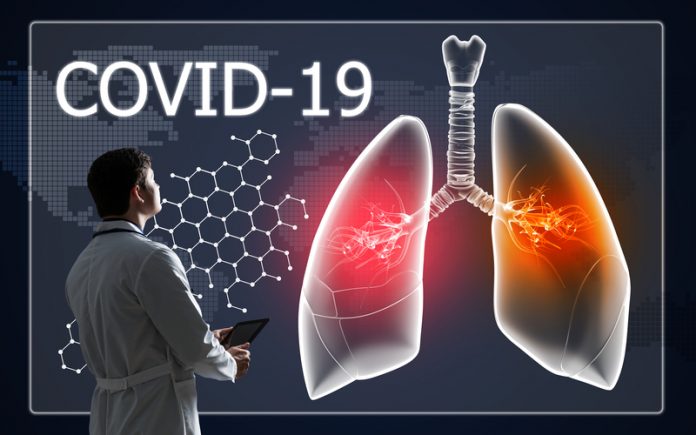A new national study, funded by UK Research and Innovation (UKRI), will investigate the long-term effects of COVID-19 lung damage
A new study called the UK Interstitial Lung Disease Long-COVID19 (UKILD-Long COVID) study will investigate whether post-COVID-19 lung damage will improve or worsen over time, how long it will last and the best strategies for developing treatments.
It will be supported with £2.2 million of funding from UK Research and Innovation (UKRI) and led by researchers at Imperial College London, who will collaborate with a further 15 research centres.
Long-COVID
Early evidence indicates that lung damage occurs in 20% of patients discharged from hospital, but the effects on people in the community aren’t clear.
Long-term symptoms of lung damage include breathlessness, coughing, fatigue, limited ability to exercise and in severe cases, the lungs may become scarred. The scarring causes stiffness in the lungs, which can make it difficult to breathe and get oxygen to the bloodstream.
Researchers hope to recruit 250 people with symptoms of possible lung scarring, ranging from those who have been hospitalised to those in the community who had less severe COVID-19.
Professor Gisli Jenkins, at Imperial College London, who is leading the study, said:
“This is an ambitious study that will help us understand how common and severe the long-term pulmonary consequences of COVID-19 are, and will help us develop new treatment approaches for people suffering from long-term lung inflammation as a result of COVID-19.
“Breathlessness is a big problem for many people with Long-COVID, particularly on exertion. For people with more severe lung scarring, this can be a devastating disease. We don’t yet know how frequent and how long-term the consequences will be. Even if the long-term outcomes are no worse than for people with similar lung damage from flu, the sheer numbers of people who have had COVID-19 are so huge.”
Professor Fiona Watt, Executive Chair of the Medical Research Council, part of UKRI which funded the study, said:
“This research is key to understanding how and why the virus causes some people to suffer long-term lung effects after COVID-19 infection. It will be an important tool in developing more effective treatments for patients.”
Lung cell study
Xenon MRI scans will be performed in a subset of patients and samples of lung cells from 50 people will be collected to look at how they have altered in response to the injury.
Professor Jim Wild, at the University of Sheffield, who is leading the MRI part of the study, said:
“With novel and very sensitive lung imaging using hyperpolarised xenon MRI, we can pick up early signs of gas exchange limitation in the lungs and map this on to structural changes in the CT images and monitor with time whether the patients go on to develop interstitial lung disease.”
Professor Ling-Pei Ho, from the MRC Human Immunology Unit, University of Oxford, one of the leads in the study, said:
“Studying immune cells in the lungs of patients with post-COVID lung abnormalities adds greatly to the understanding of why patients have this persistent inflammation and scarring. This study will be one of very few to do this and will use the latest technology to analyse these cells, giving us the information of the highest resolution and potential causes for these lung problems.”
Dr Karen Piper Hanley, at the University of Manchester, who will study the cells in the lungs, said:
“This MRC award pulls together our best researchers and clinicians around the UK to build our understanding of COVID-19 and long-term lung damage post-infection, which for some individuals can be devastating.
“By bringing together this collective knowledge and expertise, this project has the potential to impact patient care globally and develop new treatments to improve lung damage post-COVID-19.”
Further information on the study and how to participate can be found here.











